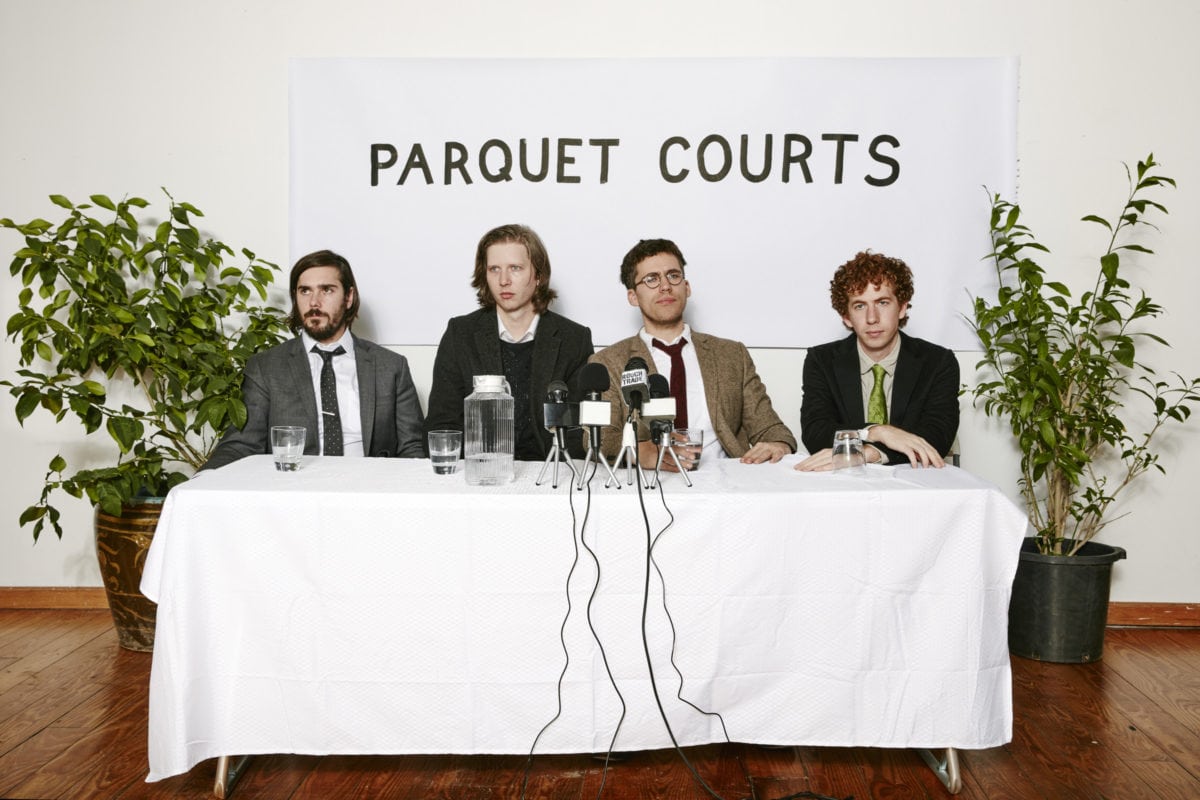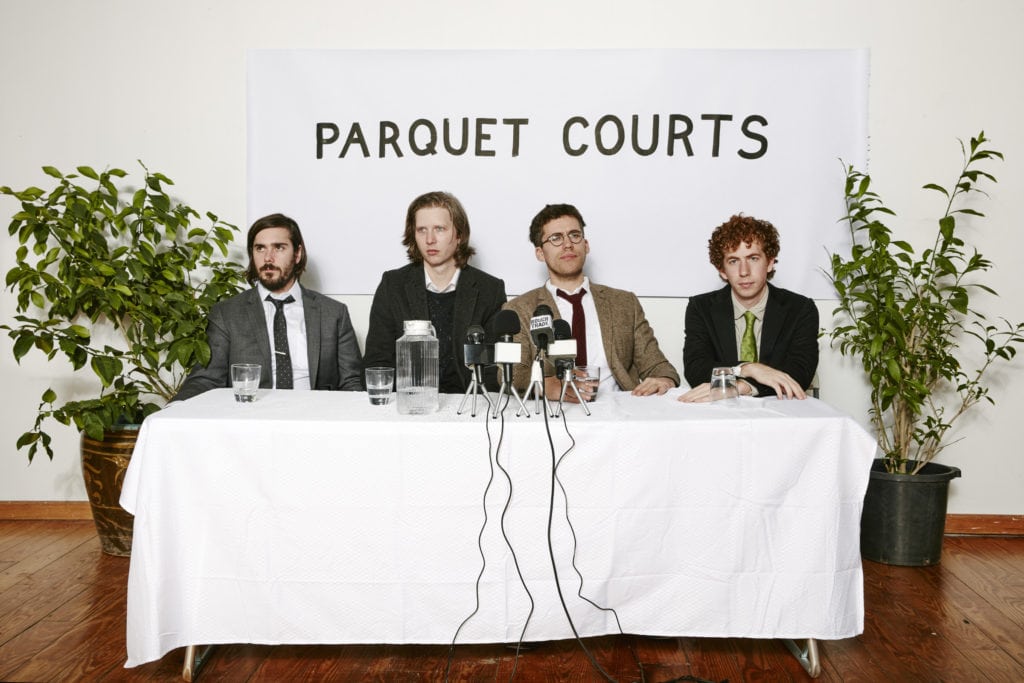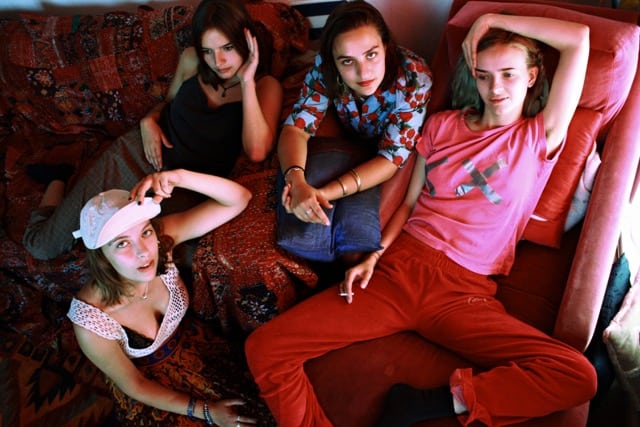Presented by Bowery Boston
Doors: 7:00 pm / Show: 8:00 pm
Tickets on sale NOW!
Tickets available at AXS.COM, or by phone at 855-482-2090. No service charge on tickets purchased in person at The Sinclair Box Office Wednesdays-Saturdays 12-7PM.
Please note: this show is 18+ with valid ID. Patrons under 18 admitted if accompanied by a parent. Opening acts and set times are subject to change without notice. All sales are final unless a show is postponed or canceled. All bags larger than 12 inches x 12 inches, backpacks, professional cameras, video equipment, large bags, luggage and like articles are strictly prohibited from the venue. Please make sure necessary arrangements are made ahead of time. All patrons subject to search upon venue entry.
***
Parquet Courts
Parquet Courts began their 2014 release Content Nausea with the repeated refrain, “everyday it starts – anxiety!” And while that track left off at just its start, Human Performance dives in, picking apart the anxieties of modern life with the band’s most innovative and emotional collection of songs to date. Not that that’s the whole story.
“The final product of this album is Exhibit A that we made it through the shit, solved the problem, had the chuckle, took the piss, made up with the other guy, and got home in one piece,” laughs bassist Sean Yeaton.
Whereas other Parquets Courts albums were recorded in a matter of days or weeks, for Human Performance the band took an entire year; it’s the first LP that finds all four band members contributing songs.
Human Performance brings expansive sonic experimentation and shining melodic introspection onto matters of the heart, matters of humanity, of identity. “I told you I loved you, did I even deserve it when you returned it?” singer/guitarist Andrew Savage wonders on the title track. It’s also their most pop-oriented collection yet, coming only months after the release of the largely instrumental Monastic Living EP; a record that was actually made at the same time.
“In a way, Monastic Living was like a palate cleanser for us as a band,” explains singer/guitarist Austin Brown, who produced the entire record, and mixed it in Austin at Jim Eno’s Public Hi-Fi, “maybe a return to our roots of improvising together, and being a bit more free, and seeing what kind of new sounds we could make.”
The recording sessions started at Justin Pizzoferrato’s Sonelab in Western Massachusetts. Some of it was also made with Tom Schick and Jeff Tweedy at The Loft, Wilco’s visionary studio in Chicago, but the majority of Human Performance was made at Dreamland Studios, a massive upstate NY pentecostal church where records have been made by The Breeders, Dinosaur Jr, and the B-52s (including “Love Shack”). They spent three weeks straight there, writing by day and recording with Pizzoferrato by night.
The result is a record with a palpable sense of fragility. “The process of writing and recording Human Performance, for me, was a fairly uncomfortable confrontation with my emotions,” Savage says. “Emotions I don’t think I’ve fully explored in my life, artistic or otherwise.”
Human Performance is fittingly laced with as much static as softness, with tight-wound percussion pushing along meandering, wistful melodies. There are dazed and disoriented earworms, echoing group chants, downtempo ballads with wired riffs. Lovers leave, existential confusion replaces them, weeks pass, the J train rolls by.
The record leads with “Dust”, a 4-minute opener that takes the mundane daily duty of sweeping the floor and turns it into a frantic, obsessive call for action. “Dust is everywhere … Sweep!” they drolly repeat, before their cyclic back beat gives way to explosive, everyday city sound of car horns.
Savage says “Human Performance” is his most personal song on the record, a solemn musing on love drifting away, a picture-perfect memory of the beginning of things and a hazier recollection of the ending. “It didn’t feel right to be shouting, barking,” he says, reflecting on his tendency to really sing for this first time on this album. “I think a lot of people are attracted to a sort of cerebral side of Parquet Courts, in the lyricism. There has always been the emotional side of our band, which I think has always been an important balance, but Human Performance marks a point where the scales have tipped. I began to question my humanity, and if it was always as sincere as I thought, or if it was a performance. I felt like a malfunctioning apparatus. Like a machine programmed to be human showing signs of defect.”
Across six years, four full-length albums, and two EPs, Parquet Courts have always littered their lyric sheets with question marks, interrogating the outside world to varying degrees. Light Up Gold considered peanuts versus Swedish Fish, an introduction of their sharp, young wit and language of mundane, everyday NYC imagery. Sunbathing Animal channeled that language into noisy punk philosophy, raising wide-view questions about agency versus captivity, choice versus freewill. Content Nausea wondered about anxiety and emotional deterioration under the age of big data, in an aptly self-aware way: “And am I under some spell? And do my thoughts belong to me? Or just some slogan I ingested to save time?” And with Human Performance—their fifth album and second for Rough Trade—the question marks get turned on themselves more than ever.
“There is a lot of darkness, and general anguish being worked out on this record,” Brown adds. “But it ends kind of peacefully, kind of accepting that you can’t do much about it.”
***
Goat Girl
From the very beginning Goat Girl were always threatening to turn into a special band. Songs that use subtlety as their main ingredient while remaining disarmingly fierce at every turn. Lyrics that mean everything despite being written down in the most simplistic and non-aggressive way possible… they are an anomaly in the UK music scene as 2016 draws to a draggy close: four people playing guitars, bass and drums who have the ability to make you feel //alive// again.
The best music always comes out of nowhere, and Ellie, Lottie, Naima and Rosie seem as surprised as anybody to find themselves in their current position. “A year ago me and Ellie were playing this cult open mic night in south London run by someone who used to be in Hawkwind,” says Naima. “Then we met Lottie in the street outside a house party, then we met Rosie in the audience at The Windmill in Brixton, and then we became Goat Girl.”
Named in reference to the questionable Bill Hicks comedy sketch Goat Boy (“It’s disgusting,” says Lottie, although she’s quick to add: “But I like his social commentary, and the satirical element to what he did,”) the band are fresh out of their respective London colleges and a million miles away from everything else ‘new’ you’ll hear right now.
Goat Girl currently have upwards of 20 completed songs, each one a caustic commentary on the England they’ve grown up in. Next month they finally get around to releasing two of them on Rough Trade: ‘Scum’, quoted at the top of this article, is as full-on and dead-eyed as British rock music gets, while ‘Country Sleaze’ is a brooding two-chord time capsule that sounds like it’s been beamed over from a Seattle divebar in 1989. Both tracks were recorded purposefully quickly in a no-nonsense north London studio a few weeks ago with fast-rising producer Margo Broom.
“There’s teenage angst in them,” says Ellie. “But I think that was inevitable, growing up in London over the last ten years.” All four members of Goat Girl are under 20, but their relative youth isn’t what makes them stand out. Rather, they feel so compelling because of they way they expertly pick through the holes of so-called millennial culture, not to mention the way the media and government are messing with the minds and future plans of an entire generation. They’re truth-tellers, and this is surely the reason why so many people have been leaving Goat Girl gigs open-mouthed recently.
“I just like watching people,” says Lottie, the band’s principal lyricist and lead singer. “I think it’s nice to make lyrics obscure, so people can’t really understand them. People like dark themes, don’t they? Especially today.”
Unassuming in person, Lottie’s brilliant words undoubtedly propel Goat Girl. But as a band they’re very much a democracy, with each member as integral as the last. Just check out guitarist Ellie’s unconventional playing on fan-favourite and future anti-anthem ‘Burn The Stakes’, as well as the way drummer Rosie and bassist Naima gel on the droning, soul-spluttering ‘You’re The Man’, which is also their catchiest track to date.
Goat Girl’s raw brand of classic garage pop subversion has proved irresistible to those in the know so far, which is why despite barely playing any shows in public before this summer, nearly every day in the first quarter of 2016 a fresh face from the music industry would randomly appear at the band’s dark and damp rehearsal space in south London, contract in hand, desperately trying to sign them.
“It was kind of annoying, we just really wanted to write songs at that point!” says Lottie, adding that ultimately, being afforded the time to grow as a band was why Goat Girl decided to go with Rough Trade. “We signed on the same day as the Brexit result,” says Rosie. The irony was lost on nobody.
As a unit, Goat Girl say they’re torn on politics. Lottie’s lyrics explicitly deal with issues most other acts in 2016 seem scared to even skirt around, but the band are also acutely aware of how easy it is to become a cliché, to be labelled and put in a box.
“We’re in a weird position,” says Lottie. “With anything in music that’s succeeding, money is gonna be thrown at it. And because of that you’re running the risk of destroying what it is that makes you special in the first place. But right now, today, it’s just nice to relate to people – to feel like we’re a part of a growing community.”
As rare as they are refreshing, the band’s plan from here is simple: get ‘Country Sleaze’ and ‘Scum’ out into the world ASAP, hit the road, and record a debut album that has, as Naima puts it, “spirit, strength and simplicity” at its heart. Savvy and effortlessly inventive, Goat Girl are London in 2016 – and suddenly London feels real again.





